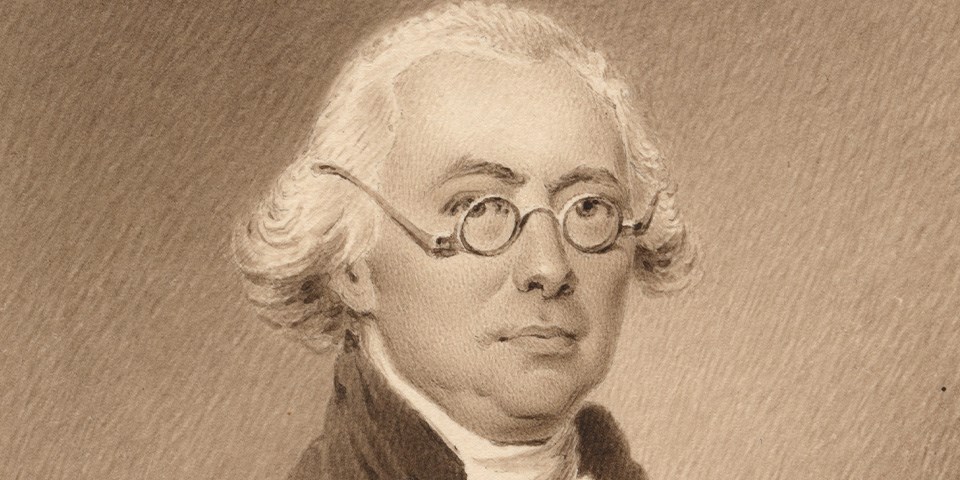Part of a series of articles titled The Constitutional Convention: A Day by Day Account for August 1 to 15, 1787.
Article
August 9, 1787: Immigrants as Senators

National Portrait Gallery, Smithsonian Institution, https://npg.si.edu/object/npg_NPG.77.299?destination=node/63231%3Fedan_local%3D1%26edan_q%3Djames%252Bwilson
"Mr. WILSON said he rose with feelings which were perhaps peculiar; mentioning the circumstances of his not being a native and the possibility, if the ideas of some gentlemen should be pursued, of his being incapacitated from holding a place under the very Constitution which he had shared in the trust of making."
--James Madison
The Convention considered the requirement that Senators be citizens for at least four years. G. Morris (PA) moved, and Charles Pinckney (SC) seconded, for a fourteen-year requirement. This touched off a lively debate. Ellsworth (CT), Madison (VA), Franklin (PA), and Randolph (VA) were all inclined against such a long citizenship requirement. They noted how many foreigners had aided the United States during the Revolution and they expressed hope that eminent, talented people from foreign countries might move to the United States and participate in the federal government. Wilson, speaking as an immigrant from Scotland, referred to “the discouragement and mortification they [immigrants] must feel from the degrading discrimination now proposed.” He thought it “grating and mortifying” that a Constitution he’d worked hard to help design might prohibit him from serving as a Senator.
The Anglo-Irish immigrant Butler (SC) took an opposite view. Madison wrote that he said that foreigners “bring with them, not only attachments to other countries, but ideas of government so distinct from ours, that in every point of view they are dangerous. He acknowledged that if he himself had been called into public life within a short time after his coming to America, his foreign habits, opinions, and attachments would have rendered him an improper agent in public affairs.”
G. Morris said he “would not trust” immigrants in the Senate. “The men who can shake off their attachments to their own country, can never love any other. These attachments are the wholesome prejudices which uphold all governments. Admit a Frenchman into your Senate, and he will study to increase the commerce of France: an Englishman, and he will feel an equal bias in favor of that of England.”
G. Morris’s motion to require fourteen years of citizenship to serve in the Senate failed, 4–7, with New Hampshire, New Jersey, Georgia, and South Carolina in favor. G. Morris and C. Pinckney then made motions requiring thirteen and ten years of citizenship, both of which failed in identical votes.
Rutledge (SC) noted, “Seven years of citizenship have been required for the House of Representatives. Surely a longer time is requisite for the Senate, which will have more power.” Williamson (NC) added, “It is more necessary to guard the Senate in this case, than the other House. Bribery and cabal can be more easily practised in the choice of the Senate, which is to be made by the Legislatures, composed of a few men, than of the House of Representatives, who will be chosen by the people.” Randolph proposed nine years, which passed 6–4–1, with Massachusetts, Connecticut, Pennsylvania, and Maryland opposed and North Carolina divided.
The Convention briefly reconsidered language giving the federal government authority to regulate elections, but ultimately decided to make no significant changes.
- The chief argument of the day was over whether immigrants could make suitable Senators.
- Ultimately, the delegates voted for the Constitution to require Senators to be US citizens for a minimum of nine years.
- Johnson (CT) dined at his boarding house, paid Matthew Cary nine shillings, and paid sixty shillings for wine.
- Washington (VA) dined at John Swanwick’s and spent the rest of the day in his quarters reading letters from home.
- Blount (NC) wrote from Philadelphia to his brother in Washington, NC. On his way from New York, he had stopped to inspect Robert Morris’s (PA) iron works near Trenton (Morrisville, PA). Blount had paid particular attention to the nail works and suggested that the Blounts might profitably use some of their slaves in a similar enterprise.
- Forty-three-year-old Elbridge Gerry (MA) wrote to his wife of a year and a half, twenty-one-year-old Ann Thompson Gerry. He described rearriving in Philadelphia with Hamilton (NY) and expressed missing Ann and their infant daughter.
- Today was clear and warm until afternoon, then showers and an evening thunderstorm moved in.
- Samuel Magaw, Chairman of the American Philosophical Society's Building Committee, wrote the directors of the Library Company to propose a meeting. Magaw wanted to know whether the Library Company would consider buying the Society's unfinished building on the State House Yard or agree to assume joint possession of it. Behind this proposal was the APS's serious problem with construction funds.
Last updated: September 22, 2023
